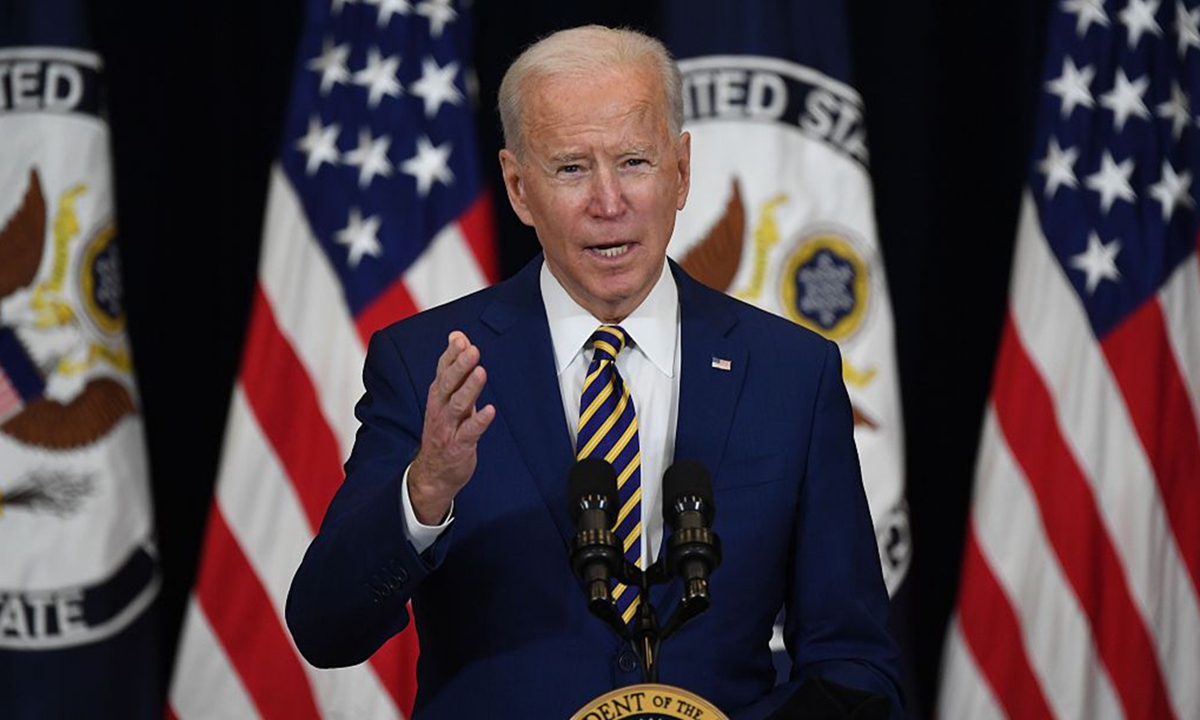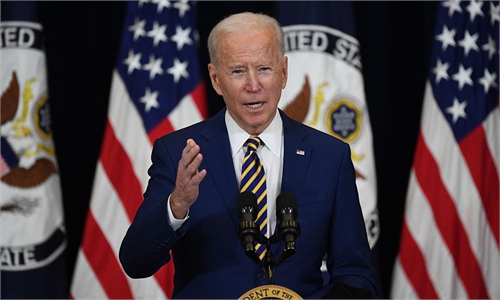
Photo: VCG
US President Joe Biden's administration indicated on Tuesday it is in no hurry to engage with China, Reuters reported, adding "it would do so once it was in 'lockstep' with allies and partners."
The stance was again stressed by the new president during his foreign policy speech at the State Department on Thursday local time.
"We are ready to work with Beijing when it's in America's interest to do so. We will compete from a position of strength by building back better at home, working with our allies and partners," Biden said. This is consistent with the previous attitude of the White House's new team, which more than once has said it will approach ties with China with "patience."
Biden believes repairing the damage done by his predecessor Donald Trump comes above confronting China. The bruises began when Trump separated the US from its allies in a harsh manner when handling China relations. This has caused US credibility to decline sharply in the eyes of its allies.
Previously, most US allies sat on the fence with ambivalent stances. On the one hand, they hope the US can keep rushing to the forefront when it comes to piling pressure on China - in this way they can reap benefits from Beijing-Washington conflicts. On the other, they were concerned about being forced to take sides. Their wish was ruined by Trump's approaches, which also jeopardized US partners' room to profit from cooperating with China. Now Biden is hoping to win back their trust again.
Trump has left a mess for Biden, especially with regard to China ties. It will take time for the Biden team to clear all the land mines laid by Trump. In addition, Biden's priority will be dealing with US domestic issues. That being said, stressing "patience" could be argued as a goodwill message from the US side, in my personal opinion.
China has already sent its messages to the US. Now all attention is pinned on Washington, with the world looking forward to seeing how it will respond. It seems the White House is in no hurry to reply. A major reason for this is Washington wants more than just goodwill from Beijing. It wants the latter to make concrete steps of compromises, so the new US administration can have the excuse to improve its ties with China while appeasing nationalism and hard-line figures in the country. Otherwise, the new team could be stuck with labels such as kissing up or kowtowing to China. But it is unlikely for China to meet its desires. The Trump administration failed to bring China to its knees. The new government does not have the capability either.
Moreover, the US hopes to solidify its advantageous position with its China ties before further engagement. As White House press secretary Jen Psaki put it on Tuesday, "We are working to ensure that we are approaching that relationship from a position of strength."
The new US administration believes China has played too great a role - greater than that of the US - in determining the nature of China-US relations. Biden does not accept such a status quo and wants to change according to the US' plan. Washington now wants to take the initiative in shaping China-US relations, instead of being led by China. Beijing had once proposed establishing a new type of major power relations, but Washington did not really respond to it. Neither did it propose any new ideas, which made Washington seem passive. The US now hopes to break the current situation.
This is the US' expectation, or even a fantasy, though Washington does not think so. The US believes it's time to alter the previous way of engagement with China, as much as it can, and it needs the effort of its allies to accomplish this.
In years to come, the US may work with its allies to put more pressure on China on human rights, and continue to decouple with China in the high-tech field. Economically speaking, Biden will not continue Trump's "lose-lose" approaches, but will try to minimize internal divergences with allies. Building a united front against China on economics and trade won't be possible, but the West will keep reducing their dependence on the Chinese market in certain sensitive industrial chains.
On militarily matters, the Biden administration won't be able to rope in more allies to participate in meddling in the South China Sea or the Indo-Pacific region. US allies are simply not interested in coordinating with the US in doing so, since China has never challenged the US militarily. Other countries are even less interested in interfering in the Taiwan question.
Then how to deal with China? In fact, the Biden administration has no mature idea yet. The relationship between China and the US is complicated. China is not like any of the US' historical competitors. It is neither the Soviet Union nor Japan. The US needs to balance its considerations from various aspects, and this explains why the Biden administration wants to be in "lockstep" with allies before engaging with China.
The article was compiled by Global Times reporter Li Aixin based on an interview with Liu Weidong, a research fellow at the Institute of American Studies at the Chinese Academy of Social Sciences. opinion@globaltimes.com.cn

